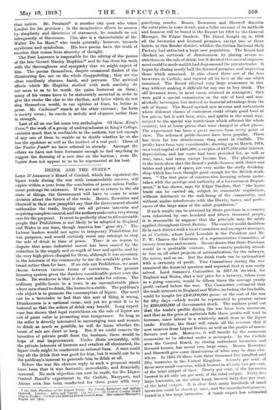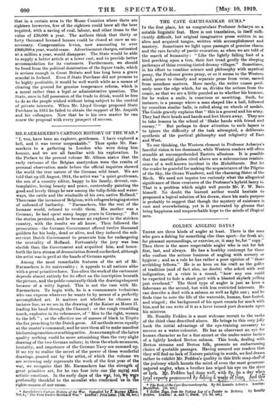DRINK AND THE STATE.*
Loan D'Azumaron's Board of Control, which has regulated the liquor trade during the war with commendable success, will expire within a year from the conclusion of peace unless Parlia- ment prolongs its existence. If we are not to return to the old state of things, the Government will have to come to some decision about the future of the trade. Messrs. Rowntree and Sherwell In their new pamphlet say that the Government should nationalize the trade, buying out all private interests and acquiring complete control, and the authors make out a very strong case for the proposal. It must be perfectly clear to all reasonable people that Prohibition is not likely to be adopted in England and Wales in our time, though America has " gone dry." The Labour leaders would not agree to temporary Prohibition for war purposes, and would certainly resist any attempt to atop the sale of drink in time of peace. There is no reason to dispute that some industrial unrest has been caused by the reduction in the supply and strength of beer and spirits, and by the very high prices charged for them, although it was necessary in the interests of the community to use the available grain for bread rather than for beer. If we rule out Prohibition, we must choose between various forms of restriction. The present licensing system gives the Justices considerable power over the trade. Its weakness is that it does not make for reform. The ordinary public-house in a town is an uncomfortable place where men stand to drink, like horses in a stable. The publican's sole object is to promote the consumption of liquor. One need not be a teetotaler to feel that this sort of thing is wrong, Drunkenness is a national curse, and yet we permit it to be fostered so that the sellers of drink may benefit. Long experi- ence lute shown that legal restrictions on the sale of liquor are not of great value in promoting true temperance. So long as the seller is directly interested in encouraging men and women to drink as much as possible, he will do harm whether the hours of sale are short or long. But if we could remove the incentive of private profit from the business, there would be hope of real improvement. Under State ownership, with the private interests of brewers and retailers all eliminated, the liquor trade might be conducted on rational lines. A man could buy all the drink that was good for him, but it would not be to the publican's interest to persuade him to drink at all.
Before the war the obvious reply to such a proposal would have been that it was fantastic, unworkable, and financially unsound. No such objection can now be made, for the LIgnor Control Board's experiment in the Carlisle, Maryport, and Annan area has been conducted for three years with very • (1) Sithe Purchase of the Liquor Trade. Ity Joseph Rowutree and Arthur ShersolL Loudon : Allen aud Unutn. I In net..]—(2) Central Control Board I !Aro, Traffic): Carlisle and District Dire,' Coneal dm. The General !tanager's Report for 1918.
gratifying results. Messrs. Rowntree and Sherwell describe the enterprise in some detail, and a fuller account of its methods and finances will be found in the Report for 1918 by the General Manager, Sir Edgar Sanders. The Board bought up in 1918 all the breweries and licensed premises, except two or three hotels, in this Border district, whither the Gretna National Shell Factory had attracted a large new population. The Board had checked an outbreak of drunkenness by placing severe re- strictions on the sale of drink, but it decided that no real improve- ment could be made until it had dispossessed the private trader. It began by closing nearly half the licensed promises and improving
those which remained. It also closed throe out of the four breweries in Carlisle, and brewed all its beer at the one which remained. The Board effected very large economies in this way without making it difficult for any one to buy drink. The old licensees were, in most awes, retained aa managers ; they were paid a special commission on the sale of food and non- alcoholic beverages, but derived no financial advantage from the sale of liquor. The Board opened new taverns and restaurants where different classes of customers could obtain good food at low prices, but it sold beer, wine, and spirits in the usual way. subject to the special war restrictions which affected the whole country, but at lower prices than were charged in other places. The experiment has been a great success from every point of view. The reformed public-houses have been popular. There has been far less drunkenness than usual in Carlisle. The profits have been very considerable, showing up to March, 1918, on a total capital of £835,000, a surplus of £107,000 after interest, depreciation, and law costs had been provided for, aa well as rent, rates, and taxes, except Income Tax. The photographs in the book show that the Board's public-houses, with choke and tables and plenty of space, are very unlike the stuffy drinking- shop which has been thought good enough for the British work- man. "The first piece of constructive licensing reform under- taken with the prestige and authority of a Government Depart- ment," it has shown, says Sir Edgar Sanders, that " the liquor trade can be carried on, subject to reasonable regulations, without detriment to the well-being of the community, and without undue interference with the liberty, tastes, and prefer- ences of the large mass of the adult population."
If such results can be attained by State purchase in a country area inhabited by one hundred and fifteen thousand people, it Is reasonable to suppose that the principle may be safely applied throughout Great Britain. The control would doubtless lie in each district with a local Committee and an expert manager, as at Carlisle, where Lord Lonsdalo is the President and Mr. F. W. Chance the Chairman of a representative Committee of twenty-four men and women. No one denies that State Purchase would be a profitable venture. The country probably stands to lose on all other projects of nationalization, for the railways, the mines, and so on. But the drink trade can be natioualized with a certainty of profit. Two Committees during the war examined the financial question and reported that it was easily solved. Lord Sumner's Committee in 1917.18 decided, for England and Wales, that a fair price for a brewery, taken over as a going concern, would be fifteen times the average yearly profit earned before the war. The Committee estimated that the trade interests in England and Wales, including the freeholds, oould be bought for £350,000,000 gross—or the cost of the war for fifty days—which would be represented in present values by £280,000,000 of Government stock. The authors point out that the trade's profits during the war have been enormous, and that as the price of materials falls those profits will tend to increase, since labour is a relatively small item in the liquor trade. Further, the State will retain all the revenue that it now receives from Liquor Duties, as well as the profits of manu- facture and sale. Moreover. it will benefit by the numerous economies to be effected under a monopoly. In the Carlisle area the Control Board, by closing redundant breweries and licensed houses, has saved very large sums. Messrs. Rowntrec and Sherwell give some illustrations of what may be done else- where. In 1914-15 there were three thousand five hundred and fifty breweries in the United Kingdom. Seventy per cent. of these were small concerns, which brewed in all only two per cent. of the total output of beer. Ninety per cont. of the breweries brewed in all only ten per sent. of the total output. Forty-five large breweries, on the other hand, brewed forty-five per cent, of the total output. It is clear that many hundreds of small breweries could be closed at once, and the manufacture.coneen- trated in a few large breweries. A trade expert has estimated
that in a certain area in the Home Counties where there are eighteen breweries, five of the eighteen could brew all the beer required, with a saving of coal, labour, and other items to the value of £30,000 a year. The authors think that thirty or forty thousand licensed houses could be closed at once as un- necessary. Compensation levies, now amounting to over LE00,000 a year, would cease. Advertisement charges, estimated at a million a year, would disappear. The State would be able to supply a better article at a lower cost, and to provide better accommodation for its customers. Furthermore, we should be freed from the political domination of the liquor trade, which is serious enough in Great Britain and has long been a grave scandal in Ireland. Even if State Purchase did not promise to be highly profitable, it would be well worth while as a means of clearing the ground for genuine temperance reform, which is a moral rather than a legal or administrative question. The State, once in full possession of the trade in drink, would be free to do as the people wished without being subject to the control of private interests. When Mr. Lloyd George proposed State Purchase in 1915 he failed to obtain the support of Mr. Asquith and his colleagues. Now that he is his own master he can renew the proposal with every prospect of success.







































 Previous page
Previous page